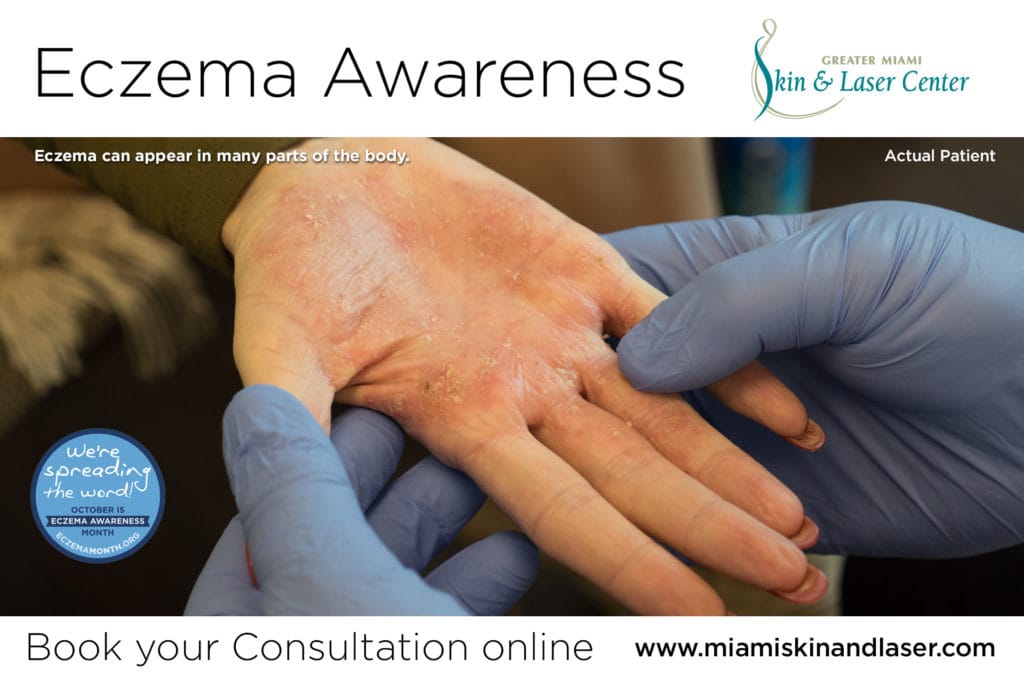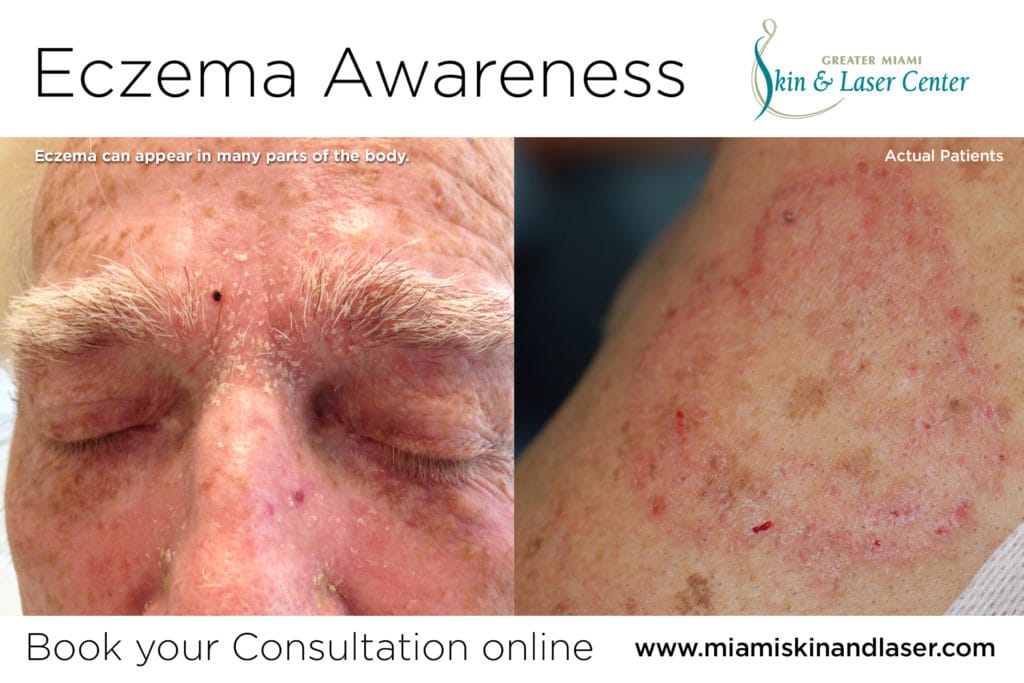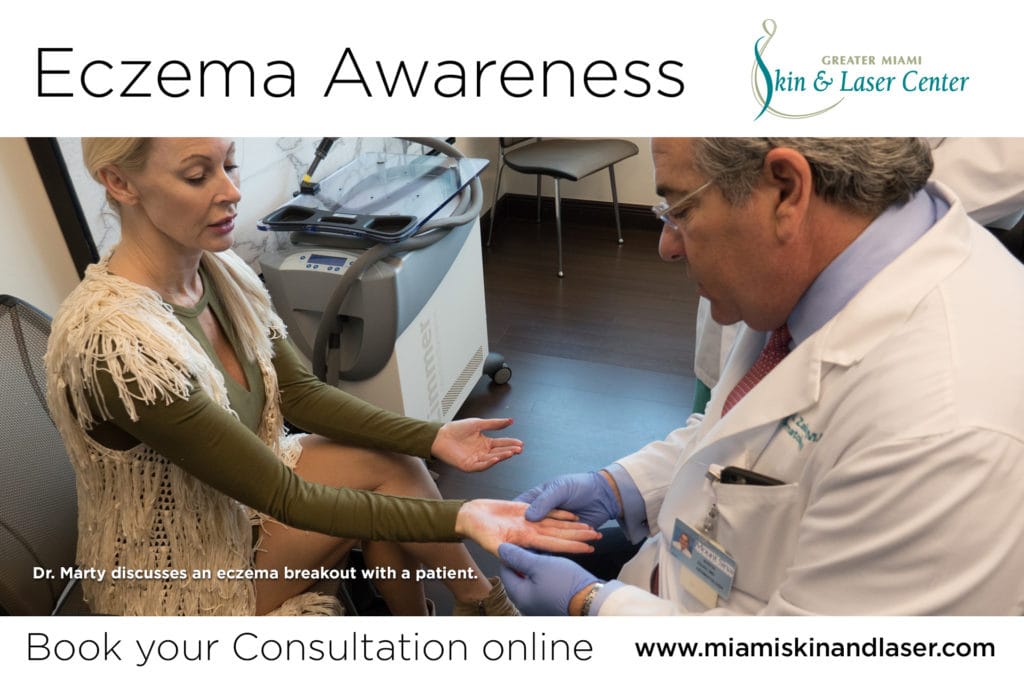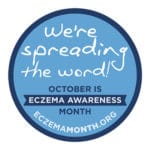Now is the time to spread the word about Eczema and I want my patients to be informed about the condition they may be experiencing. It is a fact that over 30 million people have eczema which is a term used for many skin rashes. Eczema is not really a diagnosis it is a term used to describe many different skin conditions. The term Eczema and dermatitis are used interchangeably.
The most common type of eczema is Atopic Dermatitis (AD) and it is also the most chronic form of eczema. Over 17.8 million Americans suffer with AD. Other types of eczema include dyshydrotic eczema, hand eczema, contact dermatitis, neuro dermatitis, nummular eczema, seborrheic and stasis dermatitis.
Eczema can develop on any part of the body regardless of your age. It’s common for babies and children to develop eczema on their face, but it can appear anywhere on the body. Eczema may go away as a child grows older, but some children probably will continue to experience eczema into adulthood. Adults develop eczema even if they never had it as a child. Eczema is not contagious and there is no cure for it currently, however, it can be controlled with a good regiment.
Symptoms are different for everyone but the common signs you have eczema include dry, sensitive skin, red inflamed skin, severe itching, scaly patches of skin, swelling and maybe some oozing or crusting if the skin becomes secondarily infected.

Facts about eczema
- 31.6 million people have eczema in the United States
- 17.8 million people have atopic dermatitis (AD), the most common, chronic, and severe form of eczema
- 10.7% of children in the U.S. are diagnosed with eczema or AD. In some states, this number is as high as 18.1% of children.
- 10.2% of adults are affected with eczema.
AD is commonly associated with personal and family history of Asthma or allergies. People who have asthma and/or hay fever, or who have family members who do, are more likely to develop AD than those who do not.
The impact of AD on quality of life in childhood is comparable to other chronic diseases such as renal disease, cystic fibrosis, and asthma. Difficulty sleeping is common for people with AD because of the itchiness. The impacts on the quality of life of the patient and the patients’ families can be very challenging.
According to the National Eczema Association eczema has been associated with mental health issues including depression and ADHD and can have a negative impact on self-esteem.

What causes Eczema?
Nobody knows what exactly causes eczema. However for most types of eczema, many researchers believe it is a combination of genetics and environmental factors that are involved.
One theory is that people that experience or suffer with eczema tend to have an over-reactive immune system that when triggered by an allergen or irritant, attacks the body instead of protecting it. This results in too much inflammation, which leads to red, itchy and painful skin.
Additional research also suggests that people with eczema may have a mutation of the gene responsible for creating filaggrin. Filaggrin is a protein that contributes to creating a healthy protective layer – or skin barrier – on the very top layer of our skin. Without enough filaggrin to build a strong skin barrier, moisture can escape and bacteria can enter making the skin very susceptible. This is why people with eczema have extremely dry skin and a tendency to get infections.
What triggers Eczema?
There are some everyday elements in your surroundings that might trigger eczema or cause it to get worse.
If you can figure out what triggers eczema or makes it worse it will help you keep your symptoms under control. Eczema is different for everyone. The triggers you have may not be the same as the triggers for others. You may experience triggers or worsening of your eczema at particular times of the year or in certain situations.
Tips on avoiding Eczema:
Some of the things that can trigger eczema or make it worse is, dry skin, irritants and chemicals that may be found in the air or applied to the skin without realizing they can cause your rash. A lot of evidence has shown that even stressful pressures can exacerbate eczema.
- Avoid having dry skin
Keep your skin moisturized because if your skin gets too dry it can become brittle, scaly or rough which can lead to an eczema flare up.
-
Be careful with chemicals and irritants.
There are everyday products and even natural substances that can cause your skin to burn and itch, or become dry and red and trigger your skin condition.
Products that you use on your body or in your home like hand and dish soap, laundry detergent, shampoo, bubble bath, body wash, surface cleaners, disinfectants can be triggers. Even natural liquids like the juice from fresh fruit, vegetables, or meats, can irritate your skin when you touch them. Always pay attention to what is having contact with your skin.
Well known eczema irritants include:
- Metals, in particular, nickel
- Cigarette smoke
- Liquid Soaps and other household sanitizers including baby wipes.
- Fragrances
- Hair dyes
- Certain fabrics such as wool and polyester
- Antibacterial ointments like neomycin and bacitracin

Are you stressed out?
Emotional stress is considered an eczema trigger, but we are not exactly sure why. Some people’s eczema symptoms get worse when they’re feeling “stressed.” Others may become stressed, just knowing they have eczema, and this can make their skin flare up.
Climate and Sweating
Many people with eczema become itchy, or experience a “prickly heat” sensation when they sweat, or get too hot. This can happen when you exercise or wear too many clothes to bed. During the cold winter months, your skin may also get too dry — leading to irritation and an eczema flare up.
Your eczema also may flare when the air is too dry or too humid. Or if you take long, hot showers or baths.
With so may people afflicted with eczema we do get many patients looking for ways to heal themselves. In my next blog I will let you a few ways to tackle eczema especially in the summertime.
It’s a good idea to see a dermatologist at least once a year no matter what your age is. Come see me for a complete wellness exam at the Greater Miami Skin and Laser Center. Call us on (305) 532-4478 or book your appointment online.
Dr. Marty Zaiac

Statistics provided by the National Eczema Association

